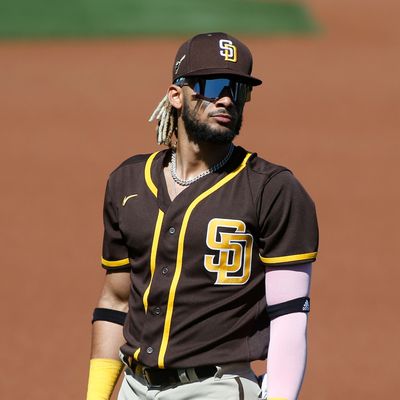
Last month, the Atlantic’s James Hamblin wrote about our Quite Possibly Wonderful Summer, how “periods of intense hardship are sometimes followed by unique moments of collective catharsis or awakening,” and thus how this summer could feel “revelatory.” Major League Baseball feels uniquely positioned to benefit from that catharsis. Of all the collective gatherings we’ve been unable to experience over the last year — sporting events, concerts, movies — sports are the ones that have an infrastructure already set up to accommodate everyone’s return. (It’s going to be a while until you can see your favorite band, no matter how quickly everyone gets vaccinated.) And if you want that feeling of sitting outside in the sun with people, drinking a beer and maybe not worrying about everything for a while, baseball is your primary, maybe only, option over the next few months. Honestly: Even if you don’t like baseball, doesn’t it sound amazing to just go to a game right now? Doesn’t it sound like the most luxurious, indulgent thing in the world?
It’s an incredible opportunity for a game that has lost considerable market share and public interest over the last two decades, and thus could use every break it can get. A sport that has seemed out of step with the times might be ideal for a summer of activity, of sunshine, of reveling. While the Texas Rangers’ decision to open its stadium to 100 percent capacity for opening day — even as the CDC warns of yet another COVID case surge — seems unwise, every other team is allowing at least some fans back in for their home opener, too. So the question is not whether or not our baseball stadiums will be full this summer. The question is how soon.
Baseball is perpetually facing complaints that it has lost its soul, how the game isn’t as exciting as it used to be. But it has plenty to offer at this particular moment, including terrific teams in major media markets (New York, Los Angeles, Chicago, and Atlanta are as likely as anyone to host the 2021 World Series), incredibly charismatic young stars who are ideal salesmen for the joy of the game (Fernando Tatis Jr., the Padres star shortstop, has Ken Griffey Jr.-esque crossover appeal, and Francisco Lindor, whose nickname is literally Mr. Smile, is about to charm the pants off New York City) and a growing rejection of the traditional “unwritten rules” that have governed the sport (and have generally involved older white gatekeepers silencing young, often Latino and Black, players), which has led to a sport that is more joyous, demonstrative, and young-fan-friendly than it has been in a generation. Baseball has a lot to sell, and this particular moment may just give it the biggest, vastest stage on which to do so. This really could be the sport’s moment.
So, that’s the good news. The bad news is that baseball has a tendency to shoot itself in the foot and this coming offseason provides ample opportunity to do so. This December 1, the Collective Bargaining Agreement, which lays out the financial rules and regulations with which baseball governs itself, expires. This CBA has long been thought to be highly advantageous to the owners rather than the players, for reasons too numerous to get into in a general-interest column. (Here’s a good Fangraphs explainer, if you’re interested.) What matters is that players want to blow up the current system, owners want to keep it, and both sides are as entrenched as they have been at any point since a labor fight caused the World Series to be canceled in 1994. They are so dug in, in fact, that they couldn’t even reach an agreement about COVID protocols coming into this season; owners wanted to push games back a month and players argued (correctly, it sure seems now) that they’d just made it through a whole season in the thick of the pandemic, and therefore there was no need to postpone any further with the virus looking more manageable than it did then. For several years now, not a single situation in baseball hasn’t been tinged with the dark specter of the impending labor fight, whether it’s Rob Manfred’s dour alarm during ESPN’s Return Of Sports special last summer or he way the big Astros scandal turned out to be legislated. (Manfred’s light touch on some of the offending players was almost certainly due to a desire to avoid picking a huge, high-profile fight with the union.) There is no bigger story in baseball — not the pandemic, not Mike Trout, not any scandal — than the looming labor battle.
Baseball has survived so much over its history, despite constant claims that it is perpetually “dying.” (This prediction “was first levied back in the 19th Century.) But the only two times it has been in actual mortal peril were in 1919 — when the Black Sox gambling scandal caused fans to lose faith in the games themselves — and in 1994, when a previous labor war forced the cancellation of the World Series. You can argue the game, for all its successes since then, hasn’t entirely recovered from 1994; it wasn’t long after that, after all, that the NFL took over from MLB as the clear American national pastime. The game has proven it can handle drug scandals, or disparity between small and large markets, or the “banging scheme” of the Astros. What always gets it in trouble, what can knock it out entirely, is when fights about money — even righteous ones, as the players could argue this coming one is — stop the games from even happening. The danger of a self-implosion is particularly acute at a time when the country is still recovering from its own pains and suffering, and may have little patience for owners and players unable to put on a simple game. How much patience do you expect the average fan to have for a labor fight right now? After everything?
This summer is an incredible opportunity for Major League Baseball. The stands will be full, the spirits will be high, the beer will be cold. It could even be a pivot moment for the sport, which really could use one. But that labor fight lurks, a train at the end of the tunnel, waiting to pulverize all the good will the sport is about to generate. This is going to be a wonderful summer for baseball. It’s now on everyone involved in the sport not to screw up what comes after.






























